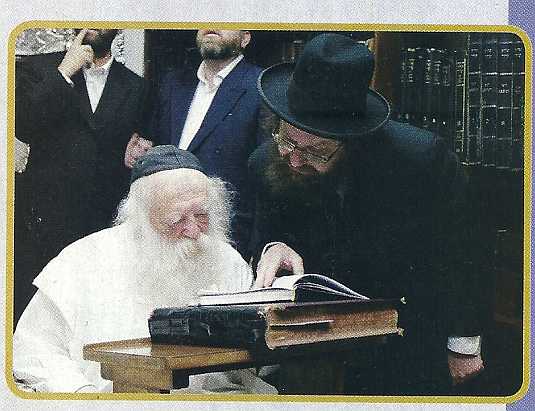A new sefer called Kol Mishalosecho has a wealth of answers to questions that were asked of HaRav Chaim Kanievsky shlita, with long answers to many of them. Here are a select few of the many stories and insights of the Sar Torah of our generation.
Part 2
The new sefer

Torah Study at Home Has a Great Impact
HaRav Chaim Kanievsky: Someone asked me yesterday regarding his Torah study. He said that he was a working man and only had time to study in the evening. Was it preferable for him to go to a beis medrash to join his study with others, whereby his very going there is meritorious, as is brought in Yerushalmi (Brochos 85:5) etc. or to study at home so that his children be inspired by seeing their father learning Torah. I told him to study at home.
What about the ruling that one's own benefit should be uppermost ("your own life has precedence")?
This, too, is considered a life-precedence, for is it not life-giving for his children to see and benefit from your example of studying Torah regularly? How much is lost if they don't see you learning? This is also "your life".
A certain Jew said that he has one son and several daughters. He takes his son to the beis medrash to study but his daughters don't see him learning.
His daughters should also see their father studying Torah. They will mature and their husbands and sons will also become bnei Torah and for this purpose it is necessary for them to see their father learning.
Torah study in the home has a tremendously favorable impact, and conversely, not doing so is detrimental. HaRav Kanievsky referred to the latter when children see their father reading a newspaper... (as is quoted in the newly published "Kol Mishalosecho")
Maran said to one of his followers: The children in your home should see their father learning. Experience proves that this is very influential.
Someone once came to me complaining that his son was not interested in learning. I sent him to HaRav Akiva Tennenbaum zt"l who dealt with this problem. I met him at a later date and asked him if there was a change in the boy. He said that he spoke to HaRav Akiva for two hours but found no solution for him. The boy said: Abba sends me off to study but what does he do? He doesn't study himself, rather, he reads a newspaper. I had no answer for him!
Insurance
Issues of hishtadlus and bitochon are interspersed throughout the new work "Kol Mishalosecho".
A man asks: There is a national arrangement for accident insurance for school children at the cost of 24 shekel per year. Should I do it?
A. If everyone does it, you need not be different, but if this is not universal, it's a pity for the money.
A man who has adult daughters at home who are still single called up several matchmakers and is awaiting their response. Is there anything else he should do in this area? Should he perhaps visit yeshivos and seek out eligible bochurim on his own or not?
A. It is unnecessary. He has fulfilled his obligation. Further hishtadlus lies in prayer.

R' Chaim with the author of the sefer
If an avreich wants to teach, should he make an effort to find himself a job, even to begin at an average institution which is not up to his talents so that he can progress from there, so as to fulfill his obligation of hishtadlus?
A. Even in this subject, one should always remember that the best form of hishtadlus is through prayer.
How much effort should women expend since this is not at the expense of Torah study etc.? Is their measure of hishtadlus different than that of men?
A. Again, the same applies to both that the most effective form of hishtadlus is that of prayer to Hashem.
A Jew Who Gives Ma'aser but sees no Blessing in His Business
This question arises many times. Sometimes one even fails several times.
Maran says: Sometimes one sees the blessing [of aser - tisasher] immediately but sometimes only later on. Sometimes the riches are for his good and sometimes for his detriment. Sometimes the blessing is not only through money but rather in other areas. My father was asked the question about himself who was honored to be sandak (a segulah for riches) many times but remained as before. He replied that the seforim he wrote represented his wealth. Sometimes this is translated in the abolishment of a harsh decree passed against him instead of wealth. In general, we do not know the workings of Heaven at all.
No Bombs Will Fall in Bnei Brak
At a Shabbos meal of Parshas Bamidbar, the 5th of Sivan, 5758, I said that I had heard a true third-hand story told by Rav Y.A. Halevi Dunner.
Fifty years ago, the declaration of statehood fell on a Friday, like this year. On Friday night, people came to HaRav Landau (who was then the rov of Bnei Brak) and said that the situation was a life-threatening one and if there will be bombing and no shelters are available, it will be necessary to dig on Shabbos. He sent someone to ask the Chazon Ish when he could come to him and the latter said, at 9. At that designated time, he went to ask his question, accompanied by several rabbonim.
The Chazon Ish said: "If it is truly a question of pikuach nefesh, it is permissible, but if not, it is forbidden."
HaRav Landau said: "I know that as well. My question was if the situation constitutes pikuach nefesh."
To which he replied in the same words: "If it is truly a question of pikuach nefesh, it is permissible, but if not, it is forbidden."
HaRav Landau wanted to know exactly what to do and the Chazon Ish replied: Send someone to Tel Aviv to ask there about the situation.
How long would going and coming take? The answer: An hour and a half. A man was duly dispatched, while the delegation remained by the Chazon Ish to await his report.
Twenty minutes later, the Chazon Ish said: "There will be no bombing in Bnei Brak. Good Shabbos." And he left the room.
Bombs did fall that night. A woman got up and began screaming, "What should we do?" Her husband replied that the Chazon Ish had declared that no bombs would fall in Bnei Brak. Good night. And he went back to sleep.
Is this story true?
I heard him declare many times that Bnei Brak would suffer no bombs. I remember that particular gathering, though I was not present at it. It is possible.
So why did he tell them to send someone to go to Tel Aviv?
Because he wanted to calm them down. When he saw that it was taking too much time, he said what he said.




